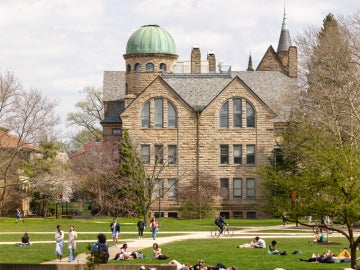Russian Evolution
Curiosity led Emma Kim to study Eastern Europe at Oberlin. Now a state department scholarship has her curious about living and studying there.
June 1, 2023
Kate Bigam Kaput

Photo credit: Tanya Rosen-Jones '97
When Oberlin native Emma Kim started taking Russian courses at Oberlin College as a high school student, she never dreamed that she’d grow to love the language so much that she would eventually double major in Russian and East European Studies (REES) and history.
“I enrolled in Russian classes out of pure curiosity, having no experience with the language, culture, or history,” says Kim, a second-year student. “It was very difficult at first, but I think the most important part of language learning is perseverance.”
Her hard work has paid off: This summer, Kim will spend two months in Bishkek, Kyrgyzstan, as a recipient of the prestigious Critical Language Scholarship. Sponsored by the U.S. Department of State, this initiative supports and expands the number of Americans mastering foreign languages considered critical to national security and economic prosperity.
In the Kyrgyz capital, Kim will live with a host family and immerse herself in local culture while taking formal Russian language classes at the American University of Central Asia. Her eight weeks of studies there will amount to the equivalent of one academic year of university-level coursework.
This won’t be Kim’s first experience with an international language scholarship program. In 2020, the National Security Language Institute for Youth offered her the opportunity to study abroad in Moldova; when the pandemic forced the program to go digital, Kim spent her gap year studying virtually from her home.
By 2022, Kim lived in Armenia as part of a two-month summer program. “I had no previous introduction to Caucasus culture, and being there profoundly impacted my experience with learning Russian,” she says. “Apart from pure language growth, I was finally able to form real, intimate relationships, and I became so much more aware of the post-Soviet space in general.”

At Oberlin, Kim has continued expanding her Russian skills—even serving as a teaching assistant for a 300-level class. Ever aware of her deepening connection to the language during a time of Russian diplomatic turmoil, she greatly values Oberlin’s approach to the Russian invasion of Ukraine.
“Right now, teaching and learning Russian has a lot of political and imperial connotations, and as a student of the language, it's important to be aware of it and to acknowledge it,” she says. “Oberlin’s Russian Department has done a good job of dealing with this dilemma. We do a lot of Russian cultural events together, but we’re also constantly discussing the current political situation.”
Kim is especially grateful to Professor of Russian Tom Newlin, who introduced her to the language, and Russian lecturer Maia Vladimirovna Solovieva, with whom she meets every week. “Nicholas Bujalski, who teaches Russian history, has also helped me to expand out of the strictly linguistic and curate my sense of the region,” she adds.
Upon arriving in Bishkek, Kim will be paired with local language partners who will engage her in conversational Russian and introduce her to everything the city has to offer.
“I’m stepping out of my comfort zone and completely immersing myself,” she says. “I’m excited to learn more about central Asia and Kyrgyz culture, but my ultimate goal is to get to know the city well, make local friends, and find a place for myself.”
You may also like…
Oberlin Launches Critical AI Studies Minor in Fall 2026
With a solid foundation in both science and the humanities, this minor ensures students to understand and be able to analyze the ethical, cultural, environmental, political, economic, technological, and labor effects of AI.
Chudi Martin Jr. ’24 Earns Prestigious Gates Cambridge Scholarship
Chudi Martin Jr. ’24 earns prestigious Gates Cambridge Scholarship.
Oberlin Named a Top Producer of Fulbright Students for 2025-26
Oberlin College and Conservatory was named a Top Producer of Fulbright students for the 2025-2026 academic year.


